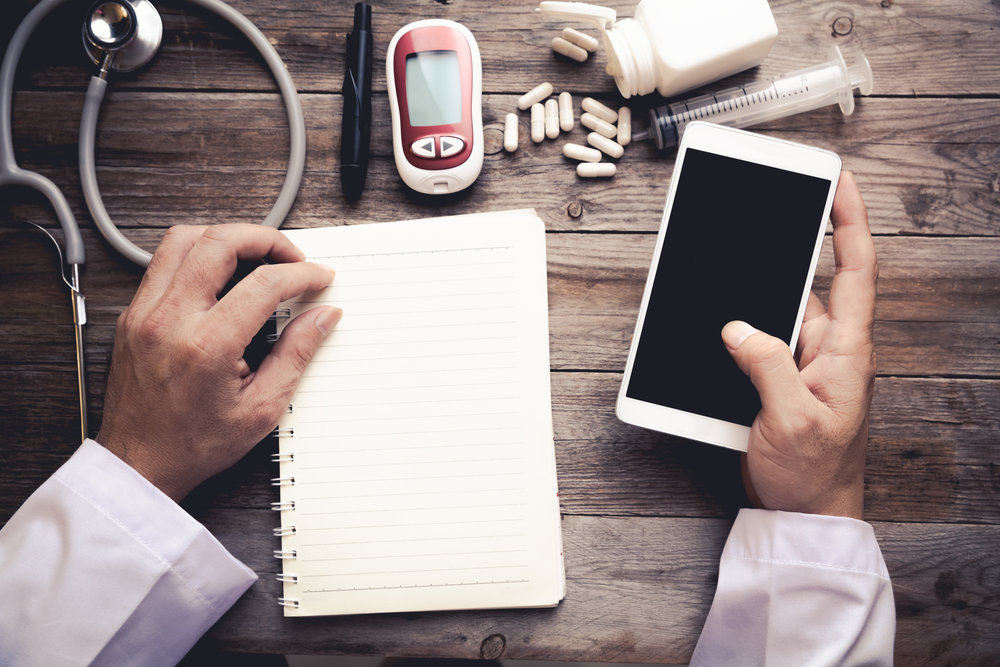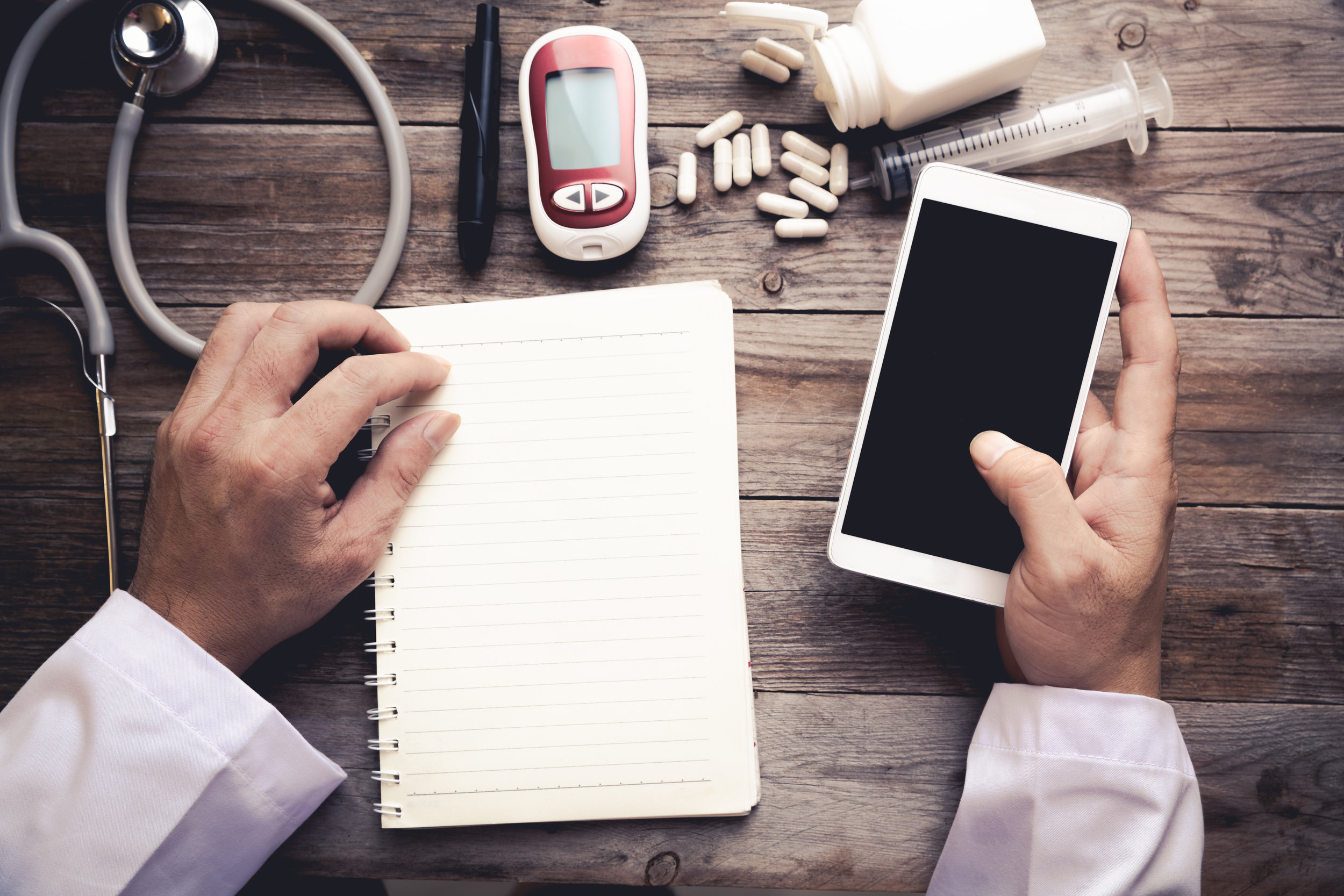Building, Engaging, Managing and Analyzing your Research

In today’s society, people use their phones for almost everything. Whether it’s ordering food, organizing finances or scheduling out your day to day – the most used tool in life is your mobile device.
When it comes to conducting population-based research studies there are many limitations when doing research in the hospital or lab setting. It is almost impossible to get accurate and real-time data. For example, many studies rely upon people recalling what they did, what they ate, and how they felt weeks before their face to face appointment. You can get tacos in 15 minutes using your phone. But if your endocrinologist asked you what you ate for dinner two weeks ago, would you be able to tell him? Using a phone as a data collection tool can give the patient the ability to update their symptoms, and activities in real time in a way that they are already familiar with.
So why shouldn’t these technologies and their benefits be applied to work in healthcare as well? Why can’t today’s research tool be your phone?
The Brigham Mobile Research Platform, supported by the Brigham Digital Innovation Hub, is a suite of tools that speed the process to initiate new research app-based protocols, recruit and retain participants, and simplify data collection, analytics and research operations.
“As iHub was working with clinicians and the research community, we started to hear requests from folks saying they wanted to use a mobile app to do some research with their patients,” said Josie Elias, Program Manager, Digital Health Innovation at iHub.
iHub started by thinking through some of the main questions: What do we need to build this? What is important to both researchers and the Brigham overall? What are some of the standard functions needed? And how do we create a system where more researchers can build mobile apps?

Build:
The Brigham Mobile Research Platform was built with standard modules that many research studies will need but no one wants the hassle of building – like security and IRB requirements – in addition to modules for creating patient generated data. The team takes these original modules and brings them together to meet the individual need of each future project and innovator.
With the base technology already built, the process to build individual specialized apps can be sped up by months. This gives researchers and clinicians more time to focus on the study at hand. “Some researchers are beginning to consider wearable devices, or Bluetooth capabilities to conduct and enhance their study,” explained Elias. “Adding onto the framework and components of the platform, instead of starting at ‘square one,’ can eliminate cost and time.”
Throughout the development process the platform was supported by hospital and Partners teams and leadership. Because of this, the platform is approved for use at the Brigham, meeting HIPAA, IRB and marketing standards.
>
“One of the main challenges when working with external companies was the complication and price, along with those companies not really focusing on what they as researchers needed,”
– Josie Elias”
Researchers were struggling to find developers who were able to work within the unique requirements of the research community, or off the shelf solutions to meet the complex needs of academic research. “One of the main challenges when working with external companies was the complication and price, along with those companies not really focusing on what they as researchers needed,” said Elias.
Engage:
Today, the constant need to be connected can be viewed in a negative light; however, continuous connectivity can be very beneficial to those in the healthcare system, giving researchers and clinicians faster and easier access to their patients and the overall population.
The Brigham Mobile Research Platform makes it easier for researchers and their staff to engage the study participants. Sending notifications, alerts and surveys with just a push of a button, or configuring them to be triggered at the right moment, researchers can effectively leverage mobile technology by meeting participants in their natural environments.
Manage:
Many clinicians and researchers are hesitant when it comes to implementing new tools into their already saturated processes. The Brigham Mobile Research Platform has been designed with the research team’s time and processes in mind. The platform was built with its own back-end administrative platform, which is an easy-to-use management tool to best cater to each patient. This dashboard tracks participant progress, status, interactions and results, and can also serve as a communication tool between research administration staff and the study’s participants.
“The dashboard is used by our care management team to view patients’ activity, as well as send notifications via e-mail, treating it somewhat like a phone call,” explained Bob Rudin, Information Scientist at the RAND Corporation and creator of the Asthma Symptom Monitoring App, one of the first apps created on the platform. “We have had some pretty high completion rates with the 26 patients we have been surveying.”
“The Brigham Mobile Research Platform formed the core basis of my asthma symptom monitoring project which implemented an intervention that integrated patient-reported outcomes between visits into routine care,” said Rudin.
Analyze:
“How do we make sure that you, as the researcher, continue to own the data? How do we make sure it connects seamlessly with the electronic medical record (EMR)? How do we create an ecosystem by which researchers can analyze the data the way they want?” asked Elias at the November Brigham Research Institute’s Research Connection Live Lunch, to an audience of internal researcher staff.
>
“We wanted to build an app with patients’ input, but we couldn’t find a [development] partner. It was a blessing to hook up with Josie and Bob [Rudin] to create what the mHealth Research Platform is today.”
The mHealth Research Platform enables rapid and custom integration of mobile technology and connected devices, and overall has helped clinicians achieve increased engagement retention and protocol compliance. The platform has helped researchers identify trends and further insights from data. Researchers have also been able to put data in context, by connecting with other enterprise data sources as well.
“The mHealth Research Platform is the foundation of our research involving the use of mobile technology for monitoring rheumatoid arthritis (RA) disease activity between scheduled patient visits,” explained Yvonne Lee, Director of Pain Research, Division of Rheumatology, Brigham and Women’s Hospital, and creator of the Rheumatoid Arthritis App. “Without the platform, we would not have been able to get daily data from our patients in a secure, HIPAA-compliant fashion. It enables patients to easily enter data, and it enables study staff to easily access the data in real time.”
“We really struggled before we found the Digital Innovation Hub,” stated Lee. “We wanted to build an app with patients’ input, but we couldn’t find a [development] partner. It was a blessing to hook up with Josie and Bob [Rudin] to create what the mHealth Research Platform is today.”
Social and consumer habits are rapidly advancing, which means consumer’s day-to-day interactions with industries must adapt and move rapidly to keep up. It only makes sense for some of the top innovators here in the Boston healthcare system to lead some of these advancements. Meeting patients in their own natural environment, with technology that they are comfortable with and use in all areas of life, not only has the potential to bring new insights and data into studies, but could ultimately bring advancements to research overall.
With such a strong organization behind it and so much room to grow, the mHealth Research Platform has the potential to be the research tool of the new digital age.
Want to learn more about the mHealth Research Platform and how it can benefit or enhance your research study?
If so, please contact us at Brigham Digital Innovation Hub and we can help you start your journey. We will help you work out your idea and send you in the right direction for innovation.

